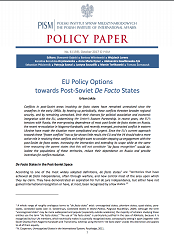№159: EU Policy Options Towards Post-Soviet De Facto States
№159: EU Policy Options Towards Post-Soviet De Facto States
Author(s): Urban Jakša
Subject(s): Politics, Governance, Public Administration, Public Law, Geopolitics
Published by: PISM Polski Instytut Spraw Międzynarodowych
Keywords: post-soviet countries; Nagorno-Karabakh; Transnistria
Summary/Abstract: Conflicts in post-Soviet areas involving de facto states have remained unresolved since the ceasefires in the early 1990s. By heating up periodically, these conflicts threaten broader regional security, and by remaining unresolved, limit their chances for political association and economic integration with the EU, undermining the Union’s Eastern Partnership. In recent years, the EU’s tensions with Russia, the ever-growing dependence of most post-Soviet de facto states on Russia, the recent re-escalation in Nagorno-Karabakh, and recently emerged, protracted conflict in eastern Ukraine have made the situation more complicated and urgent. Since the EU’s current approach towards these “frozen conflicts” has so far shown little result, the EU and the V4 should take a more active role in resolving these conflicts and might want to consider stepping up engagement with the post-Soviet de facto states. Increasing the interaction and extending its scope while at the same time reassuring the parent states that this will not constitute “de facto recognition” would de-isolate the populations of these territories, reduce their dependence on Russia and provide incentives for conflict resolution.
Series: PISM Policy Papers
- Page Count: 9
- Publication Year: 2017
- Language: English
- Content File-PDF

